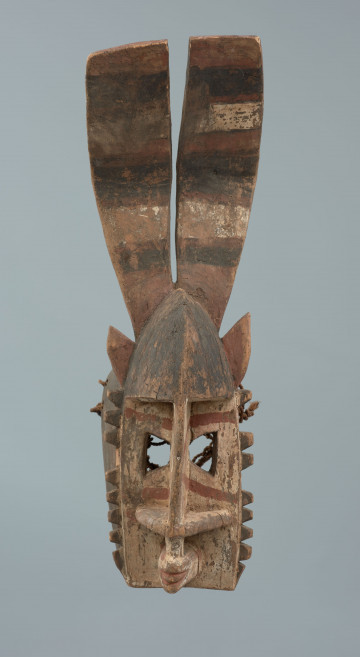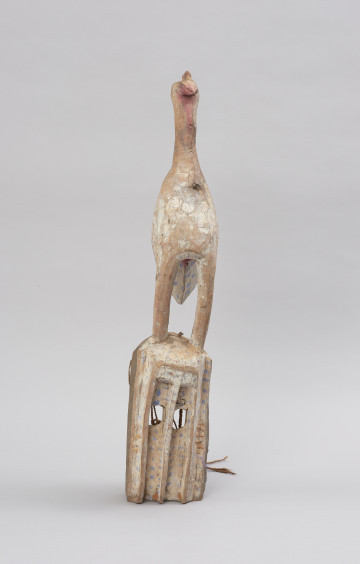
Gomintogo mask
między 1951 — 2000
National Museum in Szczecin
Part of the collection: Collection of Dogonian art
The hare mask (in the Dogo-so language: dyǫmmo, dyommõ, in the Sigi-so language: tãna pigere), like other Dogoan masks, is danced during the Dama funeral festivities ending the long period of mourning for the deceased. The Dama is supposed to contain the dangerous spiritual forces unleashed by the first death in mythical times. These forces are activated every time a Dogon dies, including in modern times.The hare is a symbol of the game but hunting it is by no means an easy task. In the areas inhabited by the Dogon, there are two species of hare: the savannah hare (Lepus microtis) and the fawn hare (Lepus capensis). Both species are nocturnal, swift animals, able to flee at speeds of up to 70 kilometres per hour. They jump aside very vigorously when running, which causes tracking dogs (or predators hunting them) to lose track. The first hare mask was made by a hunter that admired the agility and speed of this animal. It only forms a whole with the costume, which consists of indigo-coloured trousers, skirts and bracelets for the forearms and wrists made of dyed plant fibres, a braided neck guard and a kind of braided breastplate decorated with kauri shells. The dancer takes his steps carefully and slowly and pretends to be followed, now and then, he falls quickly to the ground and freezes motionless. During artistic performances outside the Dama festival, genre scenes are often played out in which masked dancers imitate hunting scenes. A man in a hunter's mask hunts for hares, but the hares are always clever and run away from him and hide among the spectators. The hare coursing mask is one of the lighter ones, which is why it is often worn by young teenage boys who have just been circumcised and have joined the Awa society.
Ewa Prądzyńska
Author / creator
Dimensions
cały obiekt: height: 38 cm, width: 15,5 cm
Object type
sculpture, mask
Creation time / dating
Creation / finding place
Identification number
Location / status

między 1951 — 2000
National Museum in Szczecin

między 1951 — 2000
National Museum in Szczecin

między 1951 — 1998
National Museum in Szczecin
DISCOVER this TOPIC
National Museum in Lublin
DISCOVER this PATH
Educational path